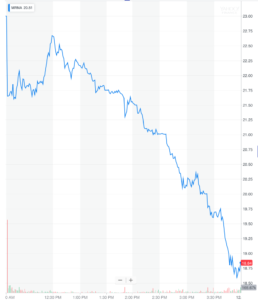Moderna Inc. (MRNA) broke biotech records — then it became a broken IPO.
The Moderna IPO was one of a kind. — as high of a profile biotech as they come. Promising early results, deep partnerships with big name Pharma (Merck, AstraZeneca, Vertex) and VC (Venture Capital) money to boot.
A private valuation of $7.5bn, making it a rare biotech “unicorn”, was matched when the deal priced at the midpoint of its range, $23.00, on Thursday night. With the 26.3mm shares sold…it meant a cash raise of $604.9 million for Moderna — the largest cash raise for a biotech ever.
According to our sources, the deal was more than 10-times oversubscribed.
But when Moderna “got in the box”… stabilization agent Goldman Sachs had a difficult time matching buyers and sellers. The first trade could only be established at $22.00 or $1.00 below issue.
What happened to all those “buyers”?
 An array of IPO Boutique clients we polled stated their allocations were “lighter than they would have expected”. In fact, we heard of a handful who were “blanked” — zero stock. If little to no stock was around…this would certainly be an ingredient for a large premium at first trade.
An array of IPO Boutique clients we polled stated their allocations were “lighter than they would have expected”. In fact, we heard of a handful who were “blanked” — zero stock. If little to no stock was around…this would certainly be an ingredient for a large premium at first trade.
Many of those traders were “interested” in the opening and potential first day “fireworks” for MRNA.
The mistake with Moderna, however, could have been the exact opposite. The largest accounts potentially received “too much” stock and killed the aftermarket appetite. Part of that blame falls on the company and the underwriters when they mutually decided to upsize the deal 20%. The other part of the blame falls on where they allocated the deal.
Our sources state that 80% of the deal was allocated to 25 investors. It “seems” the underwriters “filled” the largest investors to a spot where they potentially had a “full position”. The very best IPOs, especially deals of this size, have to maintain that delicate balance that gives a company that first day pop and leaves an aftermarket appetite.
A first day “pop” is not all too important to a company but extremely important for investor confidence. The initial uptick creates optimism, momentum, and sometimes, a long-term investor. On the flip side, a broken deal creates a falling knife — a scenario that played out tragically on Friday afternoon for Moderna.
In a bloody-red tape (-2.3% on the S&P500), Moderna capitulated and closed its first day at $18.60 or 19.1% below the offering price.
We were always under the assumption that valuation concerns “could” be in play with Moderna. These concerns “may” have kept some sector-dedicated buyers on the sidelines during day-one. Some may have “believed” the risk-reward was currently not appropriate given the $7.5bn market cap and time the investor would have to wait for any of the numerous product candidates to move through its clinical stages.
However, from a structural perspective of the IPO, a deal with this much demand should not have been this big of a disaster on day one. A combination of greed by the company (20% upsize) and improper allocations dug this company’s stock into a hole on day one.
From the start, the deal was labeled the “Grand-Daddy” of all biotech IPOs.
It turned out to be just a “Grand-Dud”.
